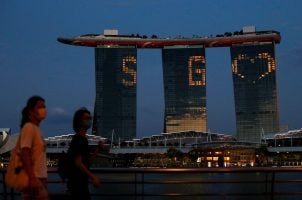Las Vegas Sands, Other US Operators Likely Win Macau Renewals, Say Analysts
Posted on: October 7, 2020, 10:27h.
Last updated on: October 7, 2020, 10:57h.
Lingering hostilities between the US and China, the world’s two largest economies, probably won’t result in American operators losing rights to run casinos in Macau, according to Bernstein analysts.

There are six concessionaires operating in the world’s largest gaming center, three of which are based in Nevada — Las Vegas Sands (NYSE:LVS), MGM Resorts International (NYSE:MGM), and Wynn Resorts (NASDAQ:WYNN). As US/China relations become increasingly volatile, there’s speculation those operators are at risk of losing Macau permits. But Bernstein dispels that notion.
We view the scenario where one or more of the US casino operators lose their gaming concession to be remote, unless the [US-China] relationship sours significantly further and we see directed action against US businesses in China, which would raise risk levels in Macau as well,” said the research firm.
Sands is the largest operator in the Special Administrative Region (SAR), controlling five properties there. MGM and Wynn each own two integrated resorts in the lone Chinese territory where gambling is permitted.
Things Stay the Same…Probably
Licenses for all six Macau concessionaires expire in mid-2022. Heading into 2020, consensus wisdom was that renewal talks would start this year. But the coronavirus is delaying that effort because Macau Chief Executive Ho Iat Seng wants local authorities to complete an exhaustive review of the gaming industry’s post-pandemic recovery trajectory.
Now, some analysts believe it will be 2022 before Macau regulators even get around to discussing license renewals, and even that timeline could be pushed out a year. Local law gives authorities some wiggle room in that they can renew current accords with gaming companies and revisit the license renewal issue in 2027.
Bernstein says it’s probable Macau operators could see some regulations to deal with, and it’s unlikely the market will open to new competitors.
“There are many levers at the government’s disposal — e.g., altering the gross gaming revenue (GGR) tax, imposing taxation on gaming profits, imposing taxation on dividends, mandating up-front fees,” according to the brokerage house.
Sigh of Relief
For investors, Bernstein’s commentary on the fate of US operators in Macau is likely a relief, because loss of exposure to that market would be highly damaging to the thesis on these names. LVS generates more than 80 percent of its earnings before interest, taxes, depreciation and amortization (EBITDA) from its Asia-Pacific operations, Macau and Singapore. Likewise, Wynn counts on Macau for two-thirds or more of EBITDA and revenue in typical quarters in standard operating climates.
Fortunately, China isn’t displaying overt hostility to American companies doing business there. It’s not unreasonable to expect Beijing realizes it could do more harm than good to Macau if marquee brands such as Sands and Wynn are driven from the market.
“Directly attacking US business (especially ones that have been solid partners to the Macau government) is not a very likely course of action,” notes Bernstein.
Related News Articles
Wynn Resorts Stock Favored as Analysts See Macau Headwinds Abating
MGM China Warns of Possible $30M Liability over Junket Holdings
Most Popular
FTC: Casino Resort Fees Must Be Included in Upfront Hotel Rates
Genovese Capo Sentenced for Illegal Gambling on Long Island
NBA Referees Expose Sports Betting Abuse Following Steve Kerr Meltdown
UPDATE: Former Resorts World & MGM Grand Prez Loses Gaming License
Most Commented
-
UPDATE: Whiskey Pete’s Casino Near Las Vegas Closes
— December 20, 2024 — 30 Comments -
Caesars Virginia in Danville Now Accepting Hotel Room Reservations
— November 27, 2024 — 9 Comments -
UPDATE: Former Resorts World & MGM Grand Prez Loses Gaming License
— December 19, 2024 — 8 Comments -
FTC: Casino Resort Fees Must Be Included in Upfront Hotel Rates
— December 17, 2024 — 7 Comments
















No comments yet